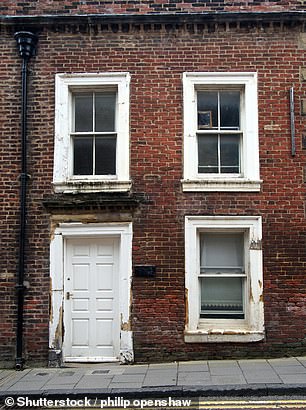Table of Contents
Doer-upper: I bought a dilapidated house and doubled its value: what are the tax rules? (Archive image)
I am a retired builder and whilst taking my granddaughter to college in Northampton I saw a house up for auction.
It was a total disaster. I had to pay £105,000 in cash because in that state you couldn’t get a mortgage on the property.
I have been commuting there every day for over four years doing all the work and sleeping there too, and since there is still work to finish, I live there most of the week.
I have another property that I bought when I got married.
It’s in my name because my wife was too young when we bought it in 1968 for hers to appear on the deeds then.
My house in Oxford is worth approximately £500,000.
The one I’m working on is worth around £200,000 or a little more, and is in my name and that of my wife.
Would it be better to put the Oxford property in both names now for tax purposes as well?
Also, can I claim expenses against taxes for the property I fixed?
SCROLL DOWN TO FIND OUT HOW TO ASK HEATHER HIS TAX QUESTION
Heather Rogers responds: Before addressing both questions, it is worth reviewing the basic tax rules relating to primary residences, the private residence relief that applies when you sell them, and the capital gains tax position on any other property you own.
The PRR is a relief from the capital gains tax normally payable on the sale of a property.
If your property meets the following criteria, then the PRR will generally apply and no capital gains will be payable on any gain made when it is sold.
– You own a property and have lived there as your primary residence for as long as you have owned it.
– You have not rented out any of the profit, unless you had one tenant at a time. If you have more than one tenant at a time, you may not be allowed the private residence exemption on the entire profit, so keep this in mind if you consider doing so.
However, if you rented out your home because you lived in work-related housing, you may still be fine.
– Part of your home has not been used exclusively for business.
– The land, including buildings, has an area of less than 5,000 square meters (about one acre).
– The property was not acquired for profit.
If you have any doubts about any of the above points, please seek advice from a professional accountant regarding your situation.
It is also worth remembering that married couples and civil partners can only own one property between them as their primary residence at a time.
If you buy a second property and live in it part-time, then within two years of that purchase you can nominate which of the two will be your main home.
If you buy a third property, you can re-nominate within two years of purchasing the third property which of the three properties is your main home.
More information can be found on the gov.uk website about nominate a property as your primary residence and General private residence relief.
If your property does not qualify for PRR in its entirety, then you may have to pay CGT.
Your home in Oxford
Turning now to the house you purchased in Oxford when you and your wife were married, if this is your and your wife’s principal residence as a couple, and if it qualifies as such, then the PRR would apply to the gain.
However, I would advise you to have your wife named in the deeds. Also, if you have not already done so, both you and your wife should draw up a will.
Your name on the deed will protect your wife if you die first, depending on the provisions contained in your will, or if you have no will and die intestate.
There are no capital gains tax implications for including your wife on the deeds, as asset transfers between husband and wife are exempt.
How ownership is held, whether as joint tenants (where both own the property in its entirety) or as joint tenants in common (where both own a specific portion), may also depend on your wills and whether or not a life interest property trust is applicable.
I suggest you consult a lawyer to help you with the issues mentioned above. In a previous column, I explained why I think people should use a lawyer to draft a will.
Heather Rogers Answers Your Tax Questions

Your home in Northampton
This house is not your primary residence and you have been renovating it, presumably for profit.
Unless you are planning to sell your Oxford house and move into the Northampton house as your home (which I understand is already in both of your names), the latter will not qualify for PRR in any way and will be subject to CGT in full on the gains.
However, you can offset the following against any profits you make.
– Acquisition costs, such as stamp duty and legal fees.
– Disposal costs, for example real estate agent fees and legal fees.
– Costs associated with establishing, preserving or defending title or rights to the asset.
– Improvement costs.
Regarding improvement expenses, the following conditions must be met to be eligible for tax relief.
– It must have been spent on the asset for the purpose of increasing its value.
– The improvement must be reflected in the condition of the asset at the time of sale.
As for the second point, this means that the enhancement must still be there and act as an enhancement.
An improvement that was wasted at the time of sale will not be counted, nor will an asset that has been disposed of (for example, an extension that was built, disliked, and demolished).
Both you and your wife also have an annual allowance of £3,000 to offset capital gains tax, unless you have made other disposals in the year the property is sold.
More information can be found on the gov.uk website at categories of allowed expenses.
It is worth noting that the profit element related to inflation is not taken into account.
In 2008, the indexation deduction that provided relief from inflation for individuals was eliminated.
At the time, capital gains tax rates were in line with income tax rates, but the trade-off for the loss of indexation was, in effect, that rates were significantly reduced.
It is interesting to hear that this issue is being raised again in this election. The Liberal Democrats have mentioned in their manifesto the possibility of reintroducing indexation.
The Conservatives would stick to the status quo. Labour has not mentioned either in its manifesto.
Some links in this article may be affiliate links. If you click on them we may earn a small commission. This helps us fund This Is Money and keep it free to use. We do not write articles to promote products. We do not allow any commercial relationships to affect our editorial independence.



